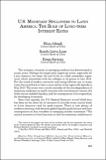| dc.contributor.author | Albagli, Elías | |
| dc.contributor.author | Leiva-León, Danilo | |
| dc.contributor.author | Saravia, Diego | |
| dc.coverage.spatial | ESTADOS UNIDOS | es_ES |
| dc.coverage.spatial | AMÉRICA LATINA | es_ES |
| dc.date.accessioned | 2019-11-01T00:07:45Z | |
| dc.date.available | 2019-11-01T00:07:45Z | |
| dc.date.issued | 2016 | |
| dc.identifier.isbn | 978-956-7421-52-7 | |
| dc.identifier.uri | https://hdl.handle.net/20.500.12580/3855 | |
| dc.description | The economic situation in emerging markets has deteriorated in recent years. Perhaps the single most important event especially for Latin America has been the end of the so called commodity supercycle which intensified with the collapse in oil prices in late 2014. But the trend of weaker currencies and rising inflation can in many cases be traced back at least a year earlier to the taper talk episode in May 2013. This event was a stark reminder of the interdependence of monetary conditions in small countries with core financial centers the fickle nature of global liquidity and the consequences of its evaporation for developing economies. | |
| dc.format | .pdf | |
| dc.format.extent | Sección o Parte de un Documento | |
| dc.format.medium | p. 285-307 | |
| dc.language.iso | eng | |
| dc.publisher | Banco Central de Chile | |
| dc.relation.ispartof | Series on Central Banking Analysis and Economic Policies no. 24 | |
| dc.rights | Attribution-NonCommercial-NoDerivs 3.0 Chile | * |
| dc.rights.uri | http://creativecommons.org/licenses/by-nc-nd/3.0/cl/ | * |
| dc.subject | TASAS DE INTERÉS | es_ES |
| dc.subject | PRODUCTOS BÁSICOS | es_ES |
| dc.title | U.S. monetary spillovers to Latin America: the role of long-term interest rates | |
| dc.type.doc | Artículo | |
| dc.file.name | BCCh-sbc-v24-p285_307 | |


